Menu
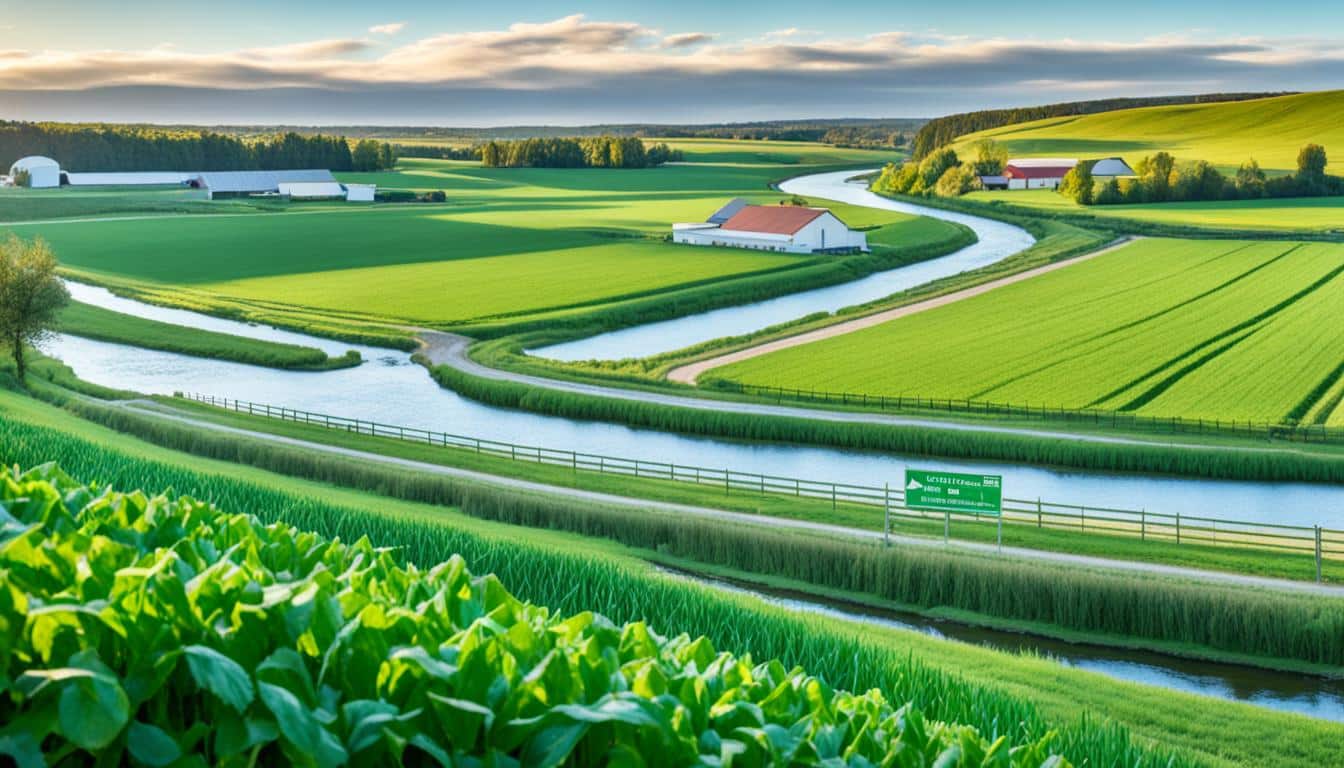
Did you know that to boost sustainable farming, GAEC 9 says farms must set aside 4% of their land? This part is for nature, not for growing crops. It shows Ireland’s strong push for farming that cares for the planet.
Ireland takes serious steps to guard its water and land. Acts like the Water Services Act and the Climate Action Act make sure of this. Organisations and projects like Teagasc, Bord Bia, and Food Wise 2025 promote green farming practices. Their goal is to link environmental care with making farms profitable. This way, they make sure using water wisely doesn’t harm nature.
The Water Services Act in Ireland plays a key role in ensuring water supply is reliable and of high quality. The Department of Housing, Local Government and Heritage funds this act. It has changed how water services in Ireland work for the better.
Irish Water, created by the Water Services Act 2013, began its work in 2014. It replaced the roles of 34 local authorities. Now, it provides water to over 80% of people through 1000 water supplies.
This agency also manages the wastewater from over 1000 areas. It looks after everything from the water you drink to what goes down the drain. The Water Services Strategic Plan guides this work until 2040. It pays special attention to the safety and quality of drinking water.
The CRU and other organisations ensure the Water Services Act’s goals are achieved. Their job is to oversee that drinking water remains clean and available. They also make sure that wastewater is treated properly, all following the Act’s rules.
In Ireland, farming is closely linked to laws that protect water. The Water Services Act makes sure that farms don’t harm water supplies. It works to prevent agricultural waste from polluting water.
Farmers and the general public alike benefit from the Act. It ensures that the water we use is safe and copes with any challenges like water boil warnings. Irish Water is using the Act to make changes that will improve water services across the country. These changes support both the economy and the environment.
The Water Services Act is vital for Ireland’s promise to farm sustainably. It covers rules on using water to support farming that doesn’t harm the environment. These rules make farming work well with water protection, meeting the goals of Irish farming policies.
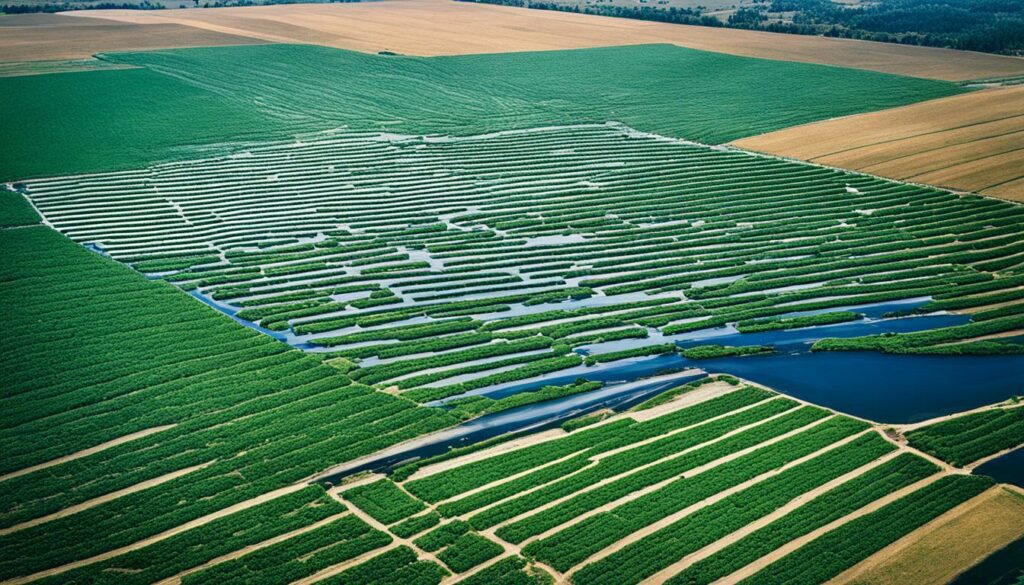
The Water Services Act deals with how water is used to protect Ireland’s water. It sets water quality rules, limits water use, and has steps to save water when it’s scarce. Farmers must avoid putting fertilisers near water, a key rule of the Irish agricultural policy.
These laws change how farmers use water, preventing harm to local water. They control when fertiliser can be used to stop it polluting water. This care helps farming stay strong while protecting the environment.
It helps keep water safe and farming eco-friendly.
| Key Project Metrics | Details |
|---|---|
| Farmland Assessed for Biodiversity | Over 2250 hectares |
| Nature-Friendly Certified Areas | 461 hectares |
| Budget | 150,000 euros |
| Smartphone Application Efficiency | Increased by over 400% |
| Farms Assessed | 43 farms |
| Adoption by Irish Farmers Journal | Footprint Farm program |
| Recognition and Citations | Government policy discussions |
Abiding by the Ireland Water Services Act is key for farmers. It ensures that their use of water for farming is done sustainably, following set rules. These rules protect our water by focusing on how water and soil are managed.
Farmers play a vital role in keeping our water clean as the Act requires. They must use good practices to stop water pollution. This means using fertilisers carefully and preventing them from reaching rivers or lakes. Doing so keeps farms in line with the law, creating an eco-friendly farming sector.
Farmers are also required to watch how they use water and ensure it’s clean. They have to keep track of this information. This helps make everyone follows the farming rules, keeping water use safe and legal.
Not following the Water Services Act can lead to serious consequences. The law has strict punishments to stop people from harming our water supply. This includes fines or other legal steps for farmers who don’t follow the rules. It shows just how important it is to protect our water through smart farming.
Irish Water and local authorities work together to make sure our drinking water and sewage systems work well. They lead projects like fixing leaks to prevent water waste. Such efforts support using water wisely in farming.
Farmers in Ireland have to look at different ways to get water. They need to follow the farming laws and make sure they use water in a smart way. They can choose from public schemes, group schemes, and using their own private water sources.
Public water schemes, looked after by Irish Water, supply water to most of the Irish people. They take care of many water supplies. This helps make sure everyone has enough water. Thanks to the Water Services Act 2013, efforts towards managing water well are supported. Each year, households can get up to €115 to help them use these schemes.
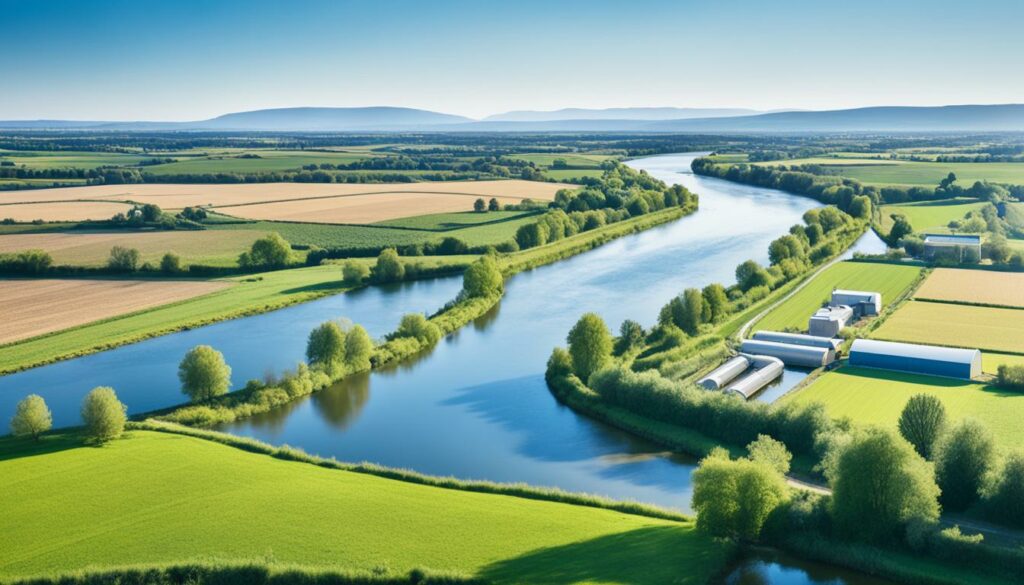
Group water schemes are common in the countryside, where there’s no plans for public water. They are shared by a few houses to make sure there’s always water. The National Federation of Group Water Schemes supports these groups. Thanks to this help, each year, households can get up to €231 to keep these schemes going.
Having your own private water, like from a well, is also an option. There are grants available to help pay for the work needed on wells. Up to 85% of the repair cost, or €3,000, can be covered by the grant. For new wells, there’s a grant of up to €5,000. This support makes private water sources more affordable for farmers.
If a farmer needs to improve the water from their private source, a grant can help cover the cost. This grant could pay up to €1,000 of these costs. Using private water sources is a good choice for farmers who want dependable water.
To keep water clean on farms, strict rules must be followed. This is key for farming to be sustainable. 75% of water pollution comes from things like Nitrogen, Phosphorus, and dirt washing into the water, says ASSAP.
Water quality standards are set by environmental laws. These rules stop farming from harming our water. Nitrogen is a big issue on soft soils. But, Phosphorus and dirt in water happen more on hard soils. To reduce this, farms can use buffer strips and keep animals away from water.
Areas that collect dirty water, like from fields, are big problems. To find these areas, PIP maps are used. They help target where to act to keep the water clean. Keeping drains well-maintained is also key. But, in some places, like nature reserves, there are extra checks to do to make sure drainage doesn’t cause harm.
Regular checks make sure water meets safety rules. This is important for both farms and the general public that uses the water. Irish local bodies and Irish Water work with the EPA to keep an eye on water standards. Managing drains well also helps protect the water.
Financial help for Irish farmers focuses on water use for farming. These funds help farmers use water in a sustainable way. They also help with keeping water sources in good shape for the future.
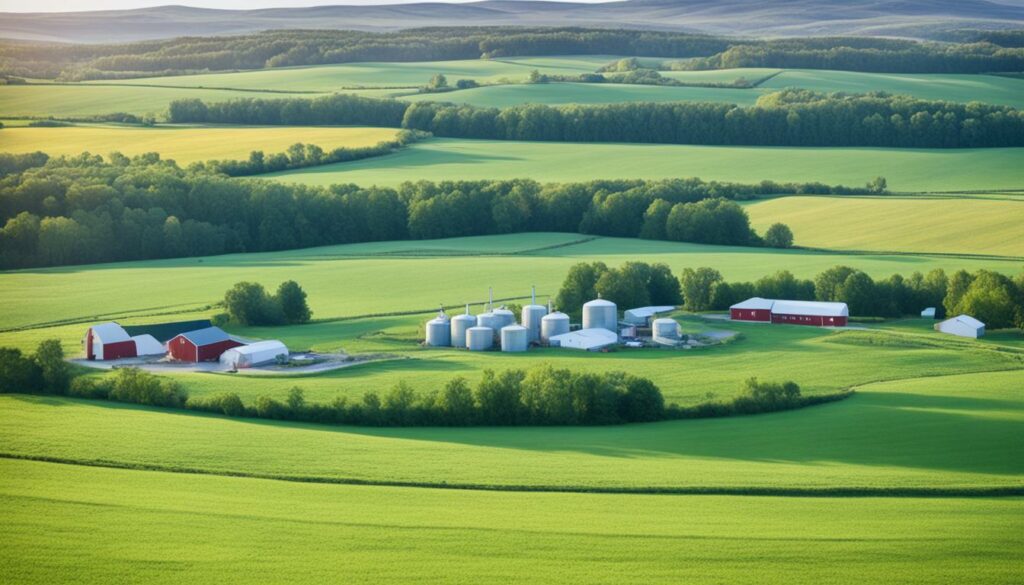
The Rural Water Programme offers grants for private wells. These are crucial for farmers who don’t have access to public water. Farmers can get up to 85% of the costs, but no more than €5,000 for each new well. This makes it easier for them to ensure they have enough high-quality water.
Farmers can get help for managing water with subsidies for group water schemes. These subsidies usually cover 85% of the costs up to €7,650 for each home in the group. This includes the costs of operating the system. There are additional subsidies of up to €100 per house for merging smaller systems.
Here is a detailed comparison of the grants and subsidies available:
| Type | Coverage | Maximum Amount |
|---|---|---|
| Private Wells | 85% of costs | €5,000 |
| Group Water Schemes | 85% of costs | €7,650 per house |
| Annual Running Costs (Group Water Schemes) | – | €115 – €231 per house |
| Small Scheme Mergers | Up to €100 per house | – |
Ireland supports sustainable agriculture with these grants and subsidies. They help farmers make the best use of water. By using these funds, farmers can improve their water systems. This helps make their farms more sustainable and productive.
Coordinating with local authorities is key for Ireland’s water services to operate smoothly and efficiently. They work together for projects and to follow important rules. How these groups work together affects how well we get our water across Ireland.
Local authorities are very important in making sure water is managed well. They check the water’s safety, making sure both public and private water is okay to use. As most people rely on public water, what they do really helps keep us healthy.
They also look after group water schemes, serving many people. These schemes must meet environmental rules to be safe and long-lasting. They keep an eye on 106 of these schemes closely to ensure they meet high quality standards.
Local authorities and Irish Water need to work closely for water services to run well. They follow the Water Services Act together to keep water safe and legal. They have agreements that show what each should do.
Irish Water relies on local authorities for many tasks. They work on projects and make sure water is safe for over 3 million people. They also handle fixing issues with 72 water supplies that don’t meet the highest standards. Working together helps meet legal requirements and keeps people and nature safe.
Irish Water and local authorities work hand in hand to meet standards and make water services better for everyone in Ireland. This teamwork is essential for success.
The Water Services Act is key to protecting our environment. It focuses on reducing dirty water and using safe methods to collect and store water. This keeps our water clean, supporting both farming and nature.
Preventing dirty water is the first big step under the Act. Farms must stop harmful substances from reaching waterways. This involves careful handling of animal waste and not spreading chemicals near water.
Storing water safely is crucial for nature protection. Farms must have good facilities to limit pollution risks. They should store waste safely to avoid leaks. There are also rules on how much water they can store, to protect our rivers and lakes.

| Emission Reductions | Target Year |
|---|---|
| 55% reduction of net greenhouse gas emissions | 2030 |
| 90% reduction of net greenhouse gas emissions | 2040 |
Obeying these laws is not just about clean water. It helps the EU meet its goals for cutting carbon by 2030, known as the ‘Fit for 55’ plan. By farming in a way that respects the environment, we protect our planet for the future.
The Water Services Act has changed how farms handle their waste in big ways. It focuses heavily on enforcing strict rules for storing and managing animal waste. The goal is to protect our water and promote farming that is good for the environment.
Now, farmers must make sure they have enough space to store manure and other waste. This is a central part of the rules they must follow. These rules say the storage areas must not leak or overflow to protect our water from pollution.
How much they need to store depends on the kind and amount of animals they have. For pigs, poultry, and animals like deer, goats, sheep, and cattle, there are specific rules. If a farm has a lot of animals, they may need even more space for their waste to keep our water safe.
Keeping these areas in good shape is key. Farmers have to regularly check and fix their storage. This makes sure our water stays clean and healthy for everyone in Ireland.
| Livestock Type | Recommended Storage Capacity | Additional Measures (if required) |
|---|---|---|
| Pigs | Minimum 26 weeks storage | Additional capacity during wet seasons |
| Poultry | Minimum 20 weeks storage | Enhanced containment for liquid effluents |
| Deer, Goats, Sheep | Minimum 18 weeks storage | Supplemental measures for large herds |
| Cattle | Minimum 22 weeks storage | Increased capacity for high-density farms |
The Water Services Act now makes farms have strong waste storage. This is not just to stop pollution but also to support farming that’s kind to the Earth. Following these waste management rules is critical to keep Ireland’s water healthy for the future.
The Water Services Act is bringing in strict rules to better manage nutrients. This is vital for keeping Ireland’s water safe. The focus is on the growing farm practices that can harm water quality.

Those who use agricultural land must follow certain rules. They should use fertilisers and manure in ways that meet water quality standards. By doing this right, they help keep water resources healthy.
The Act is key in stopping water pollution. It’s backed by a rule from 11th March 2022. This rule talks about when and how to use fertilisers and manure. It helps prevent harmful run-off, protecting water and allowing farms to grow sustainably.
Most people in Ireland drink water from public sources. And many households depend on public wastewater systems. Keeping the water they use safe is really important. It’s even more critical with the expected growth in population and work by 2040. This makes good nutrient management vital for Ireland’s water future.
| Statistic | Value |
|---|---|
| Population using public drinking water supplies | 83% |
| Households connected to public wastewater services | 66% |
| Households using septic tanks or other systems | 34% |
| Average water demand per dwelling per year | 125,000 litres |
| Households exceeding 1.7 times average water demand | 7% |
An Fóram Uisce is vital in shaping Ireland’s water policies through public engagement. It was set up in June 2018. The forum brings together people from farming, fishing, business, unions, and green groups. This wide mix ensures they look at all parts of water management.
An Fóram Uisce advises the Government on water policies and Irish Water’s work. The Water Services Standing Committee meets often to talk about national water and wastewater policies. People like Barry Deane, Dr. Connie Rochford, and Sinead O’Brien are vital in these meetings. They help set main goals at big Water Forum meetings.
Engagement is key for managing water right. An Fóram Uisce’s advice has helped cut down nitrate levels in water and fix farming practices hurting water quality. The Catchment Management Standing Committee, led by Dr. Matt Crowe, pushes for government-wide water and nature plans. It includes voices like Brendan Fitzsimons and Dr. Elaine McGoff.
According to the OECD, forums like An Fóram Uisce bridge gaps between different groups working on water issues. They tackle hard water challenges through shared ideas and talks. Some say these forums hurt democracy, but they bring more people into the water discussion and help experts share their knowledge.
| Committee | Chairperson | Prominent Members |
|---|---|---|
| Water Services Standing Committee | Barry Deane | Dr. Connie Rochford, Sinead O’Brien |
| Catchment Management Standing Committee | Dr. Matt Crowe | Brendan Fitzsimons, Dr. Elaine McGoff |
Inside An Fóram Uisce, special groups are made when the need arises. They work hard to inform and teach the public. Experts like Dr. Alec Rolston and Dr. Gretta McCarron lead the way. They show the true value of water and how it should be managed in Ireland.
Ireland’s agriculture sector is focusing on long-term sustainability. It’s key to future planning. Programs like Food Wise 2025 and Origin Green show Ireland’s commitment to a sustainable future.
Farming’s future is linked to how well it adapts and mitigates challenges. With a growing population, ensuring enough sustainable water is crucial. More than 80% rely on over 1000 public water supplies, showing the need for careful water resource management.
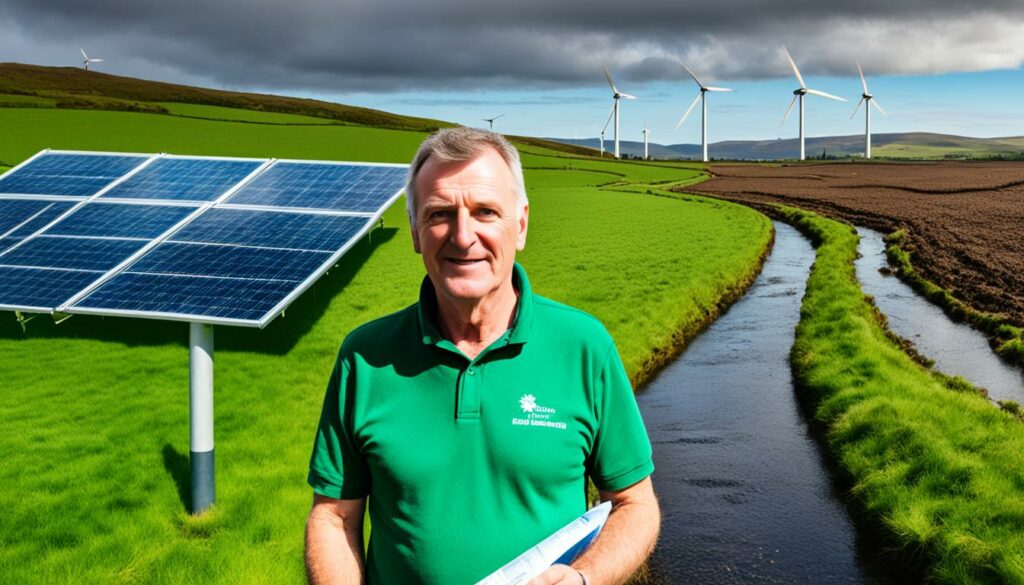
Irish Water is making big strides to meet future water needs. It’s improving to remove contamination issues. A large number of customers currently face Boil Water Notices. This shows the ongoing need for better water treatment and supply.
To reach sustainability goals, key strategies focus on water use, waste management, and agriculture practices. Irish Water managing wastewater in over 1000 areas helps protect the environment. It also supports growth.
Irish Water aims to improve services until 2040. It wants to meet high expectations and keep the environment safe. Fighting a 45% network loss and ensuring water safety for over 630,000 people are big tasks.
| Key Focus Areas | Goals |
|---|---|
| Meeting Customer Expectations | Effective implementation of charging schemes, accurate customer databases, and willingness to pay |
| Ensuring Safe Water Supply | Eliminate microbiological contamination, manage public water supplies, and supply resilience |
| Environment Protection | Effective wastewater management and water conservation |
| Social and Economic Growth | Support through efficient water services and infrastructure investments |
Ireland faces challenges from climate change and a growing population. It’s crucial to align strategies with sustainability goals. Working together, we can protect water, and the agriculture sector can thrive.
Ireland’s Water Services Act is crucial for both agriculture and water protection. This act promotes sustainable farming. It also ensures the water sources are safe. Many programmes and initiatives help, like the Rural Water Programme. This shows that most people in Ireland get their water from public sources.
Also, 34% of houses use public sewage systems. This shows that there’s good support for keeping the environment safe.
Over the next decade, €8.5 billion will improve water and sewage systems. This big amount of money will help make water cleaner for 148 areas. It will also prepare for more people moving to Ireland by 2040.
These plans will help make sure there’s enough clean water for everyone.
Irish Water and local councils have worked together since 2014. They have made a lot of progress. But, the EPA warns that some water quality still needs to get better.
Feedback from water experts has helped. They suggest specific actions to improve water quality. Their plan has helped see some good changes.
The Water Services Act needs farmers to take part. It encourages good ways to use water. This act is supported with strong rules, skilled management, and enough money.
It aims to make farming better for the long term and protect the environment. Working on water safety is a job that never ends. But, this act guides us towards a future where we use water wisely and farm responsibly.